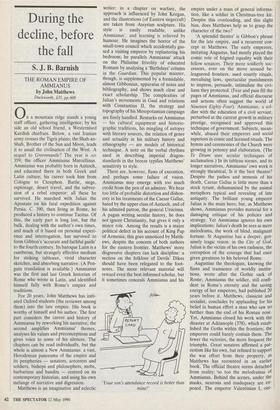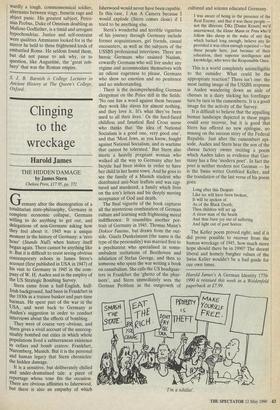During the decline, before the fall
S. J. B. Barnish
THE ROMAN EMPIRE OF AMMIANUS by John Matthews
Duckworth, £35, pp.608
0 n a mountain ridge stands a young staff officer, gathering intelligence; by his side an old school friend, a Westernised Kurdish chieftain. Below, a vast Iranian army crosses the Tigris plains; the Shah-an- Shah, Brother of the Sun and Moon, leads it to assail the civilisation of the West. A sequel to Greenmantle? The year is AD 359; the officer Ammianus Marcellinus. Ammianus was probably born in Antioch, and educated there in both Greek and Latin culture; his career took him from Cologne to Ctesiphon. Battle, siege, espionage, desert travel, and the subver- sion of a rebel emperor: all these he survived. He marched with Julian the Apostate on his fatal expedition against Persia. C. 390, then living in Rome, he produced a history to continue Tacitus. Of this, the early part is long lost, but the bulk, dealing with the author's own times, and much of it based on personal experi- ence and interrogation, has survived to form Gibbon's 'accurate and faithful guide' to the fourth century. Its baroque Latin is a cumbrous, but strangely effective medium for striking tableaux, vivid character sketches, and absorbing narrative. (A Pen- guin translation is available.) Ammianus was the first and last Greek historian of Rome who wrote in Latin, and identified himself fully with Rome's empire and traditions.
For 20 years, John Matthews has initi- ated Oxford students (the reviewer among them) into the late empire. His book is worthy of himself and his author. The first part considers the career and history of Ammianus by reworking his narrative; the second amplifies Ammianus' themes, analyses his values and preconceptions and gives voice to some of his silences. The chapters can be read individually, but the whole is almost a New Ammianus: a vast, Herodotean panorama of the empire and its peripheries — senators, sorcerers and soldiers, bishops and philosophers, mobs, barbarians and bandits — centred on its contemporary historian, and using his own melange of narrative and digression.
Matthews is an imaginative and eclectic writer: in a chapter on warfare, the approach is influenced by John Keegan, and the illustrations (of Eastern siegecraft) are taken from Assyrian sculpture. His style is easily readable, unlike Ammianus', and learning is relieved by humour. He imagines the horror of the small-town council which accidentally gas- sed a visiting emperor by replastering his bedroom; he parallels Ammianus' attack on the Philistine frivolity of educated Romans by analysing a 'Birthdays' column in the Guardian. This popular manner, though, is supplemented by a formidable, almost Gibbonian, apparatus of notes and bibliography, and shows much clear and exact scholarship. The complexities of Julian's movements in Gaul and relations with Constantius II, the strategy and topography of his Mesopotamian campaign are finely handled. Remarks on Ammianus — his cultural equipment and historio- graphic traditions, his mingling of autopsy with literary sources, the relation of genre and actuality in his military history and ethnography — are models of historical technique. A note on the verbal rhythms used in describing imperial dragon- standards in the breeze typifies Matthews' sensitivity to style.
There are, however, flaws of execution, and perhaps some failure of vision. Ammianus may emerge with too much credit from the pen of an admirer. We hear too little of probable distortion and dishon- esty in his treatments of the Caesar Gallus, hated by the upper class of Antioch, and of his admired patron, the general Ursicinus. A pagan writing secular history, he does not ignore Christianity, but gives it only a minor role. Among the results is a major political defect in his account of King Pap of Armenia; this goes unnoticed by Matth- ews, despite the concern of both authors for the eastern frontier. Matthews' more disgressive chapters can lack discipline: a section on the folklore of Devils' Dikes should have been relegated to the foot- notes. The more relevant material will reward even the best informed scholar, but it sometimes conceals Ammianus and his `Your son's attendance record is better than mine!' empire under a mass of general informa- tion, like a soldier in Christmas-tree kit. Despite this overloading, and this slight bias, does Matthews help us to grasp the character of the two?
'A splendid theatre' is Gibbon's phrase for the late empire, and a recurrent con- cept in Matthews. The early emperors, imitating Augustus, had mostly played the comic role of feigned equality with their fellow senators. Their more soldierly suc- cessors, ever on the move around be- leaguered frontiers, used courtly rituals, moralising laws, spectacular punishments to impress, persuade, intimidate the civi- lians they protected. (Fear and pain fill the pages of Ammianus, and official discourse and actions often suggest the world of Nineteen Eighty-Four). Ammianus, a sol- dier with the education of a civil servant, perturbed at the current growth in military prestige, recognised and approved this technique of government. Subjects, mean- while, abused their emperors and social superiors in comic and licensed rituals. The hymns and ceremonies of the Church were growing in potency and elaboration. (The Te Deum uses secular techniques of acclamation.) In its tableau scenes, and its longer narratives, Ammianus' own work is strongly theatrical. Is it the best theatre? Despite the pathos and nemesis of his death, Caesar Gallus is little more than a stock tyrant, dehumanised by the animal metaphors typical and revealing of late antiquity. The brilliant young emperor Julian is the main hero; but, as Matthews shows, Ammianus provides material for a damaging critique of his policies and strategy. Yet Ammianus ignores his own implications: Julian's death he sees as mere melodrama, the work of blind, malignant fortune. St Augustine has a deeper, gen- uinely tragic vision: in the City of God, Julian is the victim of his own rashness, the corruption of the courage that had once given greatness to his beloved Rome.
Augustine the theologian, knowing the flaws and transience of worldly institu- tions, wrote after the Gothic sack of Rome; Ammianus the soldier, still confi- dent in Rome's eternity and the saving energy of her emperors, had published 20 years before it. Matthews, classicist and socialist, concludes by applauding for his belief in human effort a man who saw no further than the end of his Roman nose. Yet, Ammianus closed his work with the disaster at Adrianople (378), which estab- lished the Goths within the frontiers; the emperors could barely contain them. The fewer the victories, the more frequent the triumphs. Great senators affirmed a pat- riotism like his own, but refused to support the war effort from their property, as Matthews has recounted in an earlier book. The official theatre seems detached from reality; 'so too the melodramas of Ammianus. Behind the scenes, under the masks, neurosis and inadequacy are ex- posed. The emperor Valentinian I, out-
wardly a tough, commonsensical soldier, alternates between stagy, frenetic rage and abject panic. His greatest subject, Petro- nius Probus, Duke of Omnium doubling as Mafioso Godfather, is a timid and arrogant hypochondriac. Justice and self-restraint were qualities Ammianus looked for in the mirror he held to these frightened lords of embattled Rome. He seldom found them, but did not pause to ask why, or to question, like Augustine, the 'great rob- bery' that was the Roman empire.
S. J. B. Barnish is College Lecturer in Ancient History at The Queen's College, Oxford.





























































 Previous page
Previous page